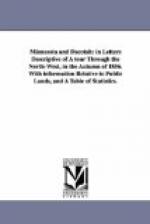It is pretty obvious too why men will leave poor farms in New England, and good farms in Ohio, to try their fortunes here. The farmer in New England, it may be in New Hampshire, hears that the soil of Minnesota is rich and free from rocks, that there are other favorable resources, and a salubrious climate such as he has been accustomed to. He concludes that it is best to sell out the place he has, and try ploughing where there are no rocks to obstruct him. The farmer of Ohio does not expect to find better soil than he leaves; but his inducements are that he can sell his land at forty or fifty dollars an acre, and preempt as good in Minnesota for a dollar and a quarter an acre. This operation leaves him a surplus fund, and he becomes a more opulent man, with better means to adorn his farm and to educate his children.
Those who contemplate coming West to engage in agricultural employment should leave their families, if families they have, behind till they have selected a location and erected some kind of a habitation; provided, however, they have no particular friend whose hospitality they can avail themselves of till their preliminary arrangements are effected. It will require three months, I judge, for a man to select a good claim (a quarter section, being 160 acres), and fence and plough a part of it and to erect thereon a cabin. There is never a want of land to preempt in a new country. The settler can always get an original claim, or buy out the claim of another very cheap, near some other settlers. The liberal policy of our government in regard to the disposal of public lands is peculiarly beneficial to the settler. The latter has the first chance. He can go on to a quarter section which may be worth fifteen dollars an acre, and preempt it before it is surveyed, and finally obtain it for $1.25 an acre. Whereas the speculator must wait till the land is surveyed and advertised for sale; and then he can get only what has not been preempted, and at a price which it brings at auction, not less than $1.25 an acre. Then what land is not sold at public sale is open to private entry at $1.25 an acre. It is such land that bounty warrants are located on. Thus it is seen the pioneer has the first choice. Why, I have walked over land up here that would now bring from ten to twenty dollars an acre if it was in the market, and which any settler can preempt and get for $1.25 an acre. I am strongly tempted to turn farmer myself, and go out and build me a cabin. The speculation would be a good one. But to acquire a title by preemption I must dwell on the soil, and prove that I have erected a dwelling and made other improvements. In other words, before a man (or any head of a family) can get a patent, he must satisfy the land officers that he is a dweller in good faith on the soil. It is often the case, indeed, that men get a title by preemption who never intend to live on their quarter section. But they do it by fraud. They have a sort of mental reservation,




